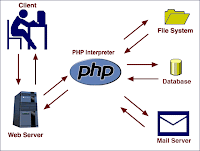- PHP stands for PHP: Hypertext Preprocessor
- PHP is a server-side scripting language, like ASP
- PHP scripts are executed on the server
- PHP supports many databases (MySQL, Informix, Oracle, Sybase, Solid, PostgreSQL, Generic ODBC, etc.)
- PHP is an open source software
- PHP is free to download and use
What is a PHP File?
- PHP files can contain text, HTML tags and scripts
- PHP files are returned to the browser as plain HTML
- PHP files have a file extension of ".php", ".php3", or ".phtml"
What is MySQL?
- MySQL is a database server
- MySQL is ideal for both small and large applications
- MySQL supports standard SQL
- MySQL compiles on a number of platforms
- MySQL is free to download and use
PHP + MySQL
- PHP combined with MySQL are cross-platform (you can develop in Windows and serve on a Unix platform)
Why PHP?
- PHP runs on different platforms (Windows, Linux, Unix, etc.)
- PHP is compatible with almost all servers used today (Apache, IIS, etc.)
- PHP is FREE to download from the official PHP resource: www.php.net
- PHP is easy to learn and runs efficiently on the server side
Where to Start?
To get access to a web server with PHP support, you can:- Install Apache (or IIS) on your own server, install PHP, and MySQL
- Or find a web hosting plan with PHP and MySQL support
Posted by
Vijay Shanker Pandey
at
3:14 AM
![]()
PHP is a powerful tool for making dynamic and interactive Web pages.
PHP is the widely-used, free, and efficient alternative to competitors such as Microsoft's ASP.
Posted by
Vijay Shanker Pandey
at
3:11 AM
![]()
PHP is a great scripting language that can be used to create amazing forms, features, and functions on your website. PHP is a widely used general-purpose scripting language that is especially suited for web development and can be embedded into HTML. It generally runs on a web server, taking PHP code as its input and creating web pages as output. It can be deployed on most web servers and on almost every operating system and platform free of charge. PHP is installed on more than 20 million websites and 1 million web servers. The most recent major release of PHP was version 5.2.6 on May 1, 2008.
PHP originally stood for Personal Home Page.It began in 1994 as a set of Common Gateway Interface binaries written in the C programming language by the Danish/Greenlandic programmer Rasmus Lerdorf. Lerdorf initially created these Personal Home Page Tools to replace a small set of Perl scripts he had been using to maintain his personal homepage.
Zeev Suraski and Andi Gutmans, two Israeli developers at the Technion IIT, rewrote the parser in 1997 and formed the base of PHP 3, changing the language's name to the recursive initialism PHP:Hypertext Preprocessor.PHP 4, powered by the Zend Engine 1.0, was released.PHP 5 included new features such as improved support for object-oriented programmingIn 2008, PHP 5 became the only stable version under development. Late static binding has been missing from PHP and will be added in version 5.3.PHP 6 is under development alongside PHP 5. Major changes include the removal of register_globals, magic quotes, and safe mode.PHP does not have complete native support for Unicode or multibyte strings; unicode support will be included in PHP 6.
Zeev Suraski and Andi Gutmans, two Israeli developers at the Technion IIT, rewrote the parser in 1997 and formed the base of PHP 3, changing the language's name to the recursive initialism PHP:Hypertext Preprocessor.PHP 4, powered by the Zend Engine 1.0, was released.PHP 5 included new features such as improved support for object-oriented programmingIn 2008, PHP 5 became the only stable version under development. Late static binding has been missing from PHP and will be added in version 5.3.PHP 6 is under development alongside PHP 5. Major changes include the removal of register_globals, magic quotes, and safe mode.PHP does not have complete native support for Unicode or multibyte strings; unicode support will be included in PHP 6.
Posted by
Vijay Shanker Pandey
at
2:53 AM
![]()
Subscribe to:
Comments (Atom)
